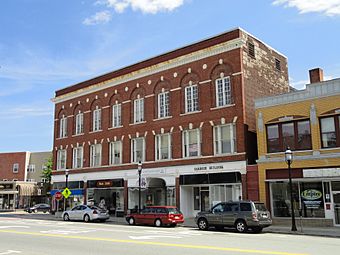Garbose Building facts for kids
|
Garbose Building
|
|
|
U.S. Historic district
Contributing property |
|
 |
|
| Location | 4-12 Pleasant Street, Gardner, Massachusetts |
|---|---|
| Area | less than one acre |
| Built | c. 1883 |
| Architectural style | Classical Revival |
| Part of | West Gardner Square Historic District (ID85003185) |
| NRHP reference No. | 83000609 |
Quick facts for kids Significant dates |
|
| Added to NRHP | April 12, 1983 |
| Designated CP | December 30, 1985 |
The Garbose Building is a cool old building located at 4-12 Pleasant Street in Gardner, Massachusetts. It was built in the mid-1880s. Later, in the 1910s, it got a big makeover. Now, it's one of the best examples of Colonial Revival style buildings in the city. This historic building was added to the National Register of Historic Places on April 12, 1983. It also became part of the West Gardner Square Historic District on December 30, 1985.
Discover the Garbose Building!
The Garbose Building stands out in the busy center of downtown Gardner. You can find it at the corner of Parker and Pleasant Streets. This area is known as West Gardner Square.
What Does It Look Like?
The building has three stories and is made of strong materials. It has a wooden frame covered with red bricks. You'll also see nice marble decorations.
On the ground floor, there are three shop entrances. The main entrance to the building also faces Pleasant Street. Each section is separated by a brick column called a pilaster. These pilasters have marble tops.
A decorative band, called a frieze, separates the first and second floors. The windows on the second floor have three parts. They are decorated with marble keystones and springers. Keystones are the wedge-shaped stones at the top of an arch.
The third-floor windows are set inside rounded arch shapes. Both the rectangular window and the arch top have marble keystones. At the very top, there's a fancy border called a cornice. Above that is a low wall, or parapet, and a flat roof.
A Peek into Its Past
When the Garbose Building was first built in the mid-1880s, it looked very different. It was in the Second Empire style. This style often included a sloped roof and a tower at the corner.
A man named Guy Garland built it. The ground floor had shops. The second floor was for offices. The third floor even had a large room for events, an auditorium.
Over the years, the building changed owners many times. Its name often changed with the new owners. In the 1920s, Abe and Samuel Garbose bought it. They had been running a clothing store there as tenants.
The big change from the Second Empire style to the Colonial Revival style happened between 1907 and 1921. This was when the Ryan Brothers owned the building.
 | DeHart Hubbard |
 | Wilma Rudolph |
 | Jesse Owens |
 | Jackie Joyner-Kersee |
 | Major Taylor |



